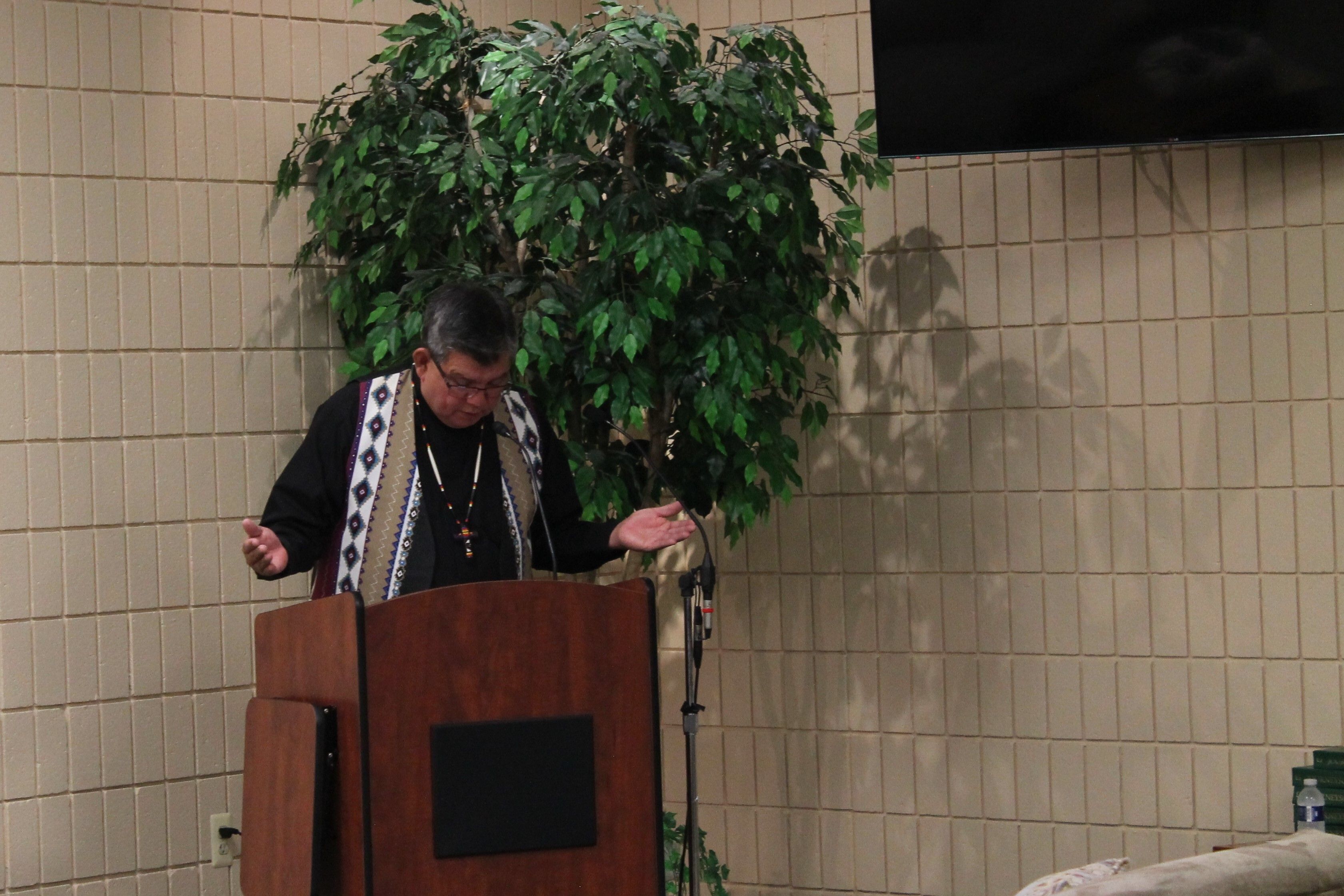Fr. Henry Sands, director of U.S. bishops' Black and Indian Mission Office, marks anniversary of St. Kateri's canonization in Dearborn
DEARBORN –– On the ninth anniversary of the canonization of St. Kateri Tekakwitha, the first Native American saint to have been canonized by the Catholic Church, parishioners of a Dearborn parish named for her gathered for a day of reflection on her holy life.
Fr. Henry Sands, a priest of the Archdiocese of Detroit and executive director of the U.S. Conference of Catholic Bishops' Black and Indian Mission Office, spoke to several dozen parishioners about the saint’s path to holiness as well as the impact of his office's work in educating and ministering to Native American and Black Catholics around the United States.
“I hope people who are here today learn things about African-American and Native American Catholics that they didn’t know before,” Fr. Sands told Detroit Catholic. “I think many people don’t know a lot about these two groups of people. People are surprised at what they didn’t know.”
Fr. Sands is an American Indian belonging to three tribes known in English as Ojibwe, Ottawa and Potawatomi. His office was founded in 1874 as a way to advocate for Native Americans with the Catholic Church and the United States government.
“The bishops at the time who had native people in their dioceses recognized that native people were subject to a lot of injustices, discrimination, and they lived in poverty; there were a lot of problems trying to get the ministry to them,” said Fr. Sands, who assumed leadership of the Black and Indian Mission Office in 2015.
Fr. Sands explained that the office provides support, particularly educational support, to people on Native American reservations, urban centers and in smaller communities around the United States.
“(We) offer an education that is high quality, but also we provide formation in the faith; we help young people develop good values and good morals, and it is a real game-changer,” Fr. Sands said. “Having that opportunity can help open doors that wouldn’t be open otherwise. Most young native people and African-American people live in areas where the quality of education provided through the public school system is very poor and always has been. The schools that are Catholic offered to these groups make a big difference in the lives of many young people.”

Fr. Sands said many Native Americans and African-Americans who have leadership roles received a Catholic education.
“It was receiving that Catholic education that enabled them to excel and have hope and have dreams and to know how they could realize the dreams they had,” Fr. Sands said.
This is especially important because of the discrimination and disadvantages faced by Native Americans and Black Americans over the centuries, even at the hands of the Catholic Church, Fr. Sands said.
Having more saints of Native American and African-American descent represented in the Church will go a long way toward making these two marginalized groups feel a greater sense of belonging, Fr. Sands explained.
“One of the reasons it is important for any group of people to have a saint that is from their background, one of their own, is because it is an affirmation of the people or a particular group as being fully members of the Church,” Fr. Sands said. “If the Church recognizes someone who is Native American or African-American as a person of heroic virtue and is receiving this recognition that they lived this special life as a disciple of Christ, it is an affirmation of who we are and is also someone who is a hero for us, someone we can celebrate, someone we can look up to.
"For all of us as human beings, we need heroes and role models, and to have a hero from your background, that means a lot,” Fr. Sands said.
At this point in time, St. Kateri is the only Native American saint, although the Vatican is considering the sainthood cause of Nicholas Black Elk, a member of the Oglala Lakota people, who currently is considered a “Servant of God.”
The Black Catholic community is still waiting for its own representation, with several names being considered for sainthood, many of whom were slaves or descendants of slaves, including Pierre Toussaint, Augustus Tolton, Mary Elizabeth Lange and Sr. Thea Bowman.
Christians are all called to holiness in their daily lives, Fr. Sands said, and St. Kateri’s life has many examples of living in holiness for the Lord, he explained.
"We are all very blessed because the Lord has called us to himself, and we are all very blessed because we are part of the body of Christ,” Fr. Sands said. “Everything that God gives to us, every good thing, is not meant to just be kept to ourselves. He wants us to share what has been given to us; He wants us to share His Gospel message. He wants us to be good witnesses to other people with the example of our lives living as faithful disciples of our Lord Jesus Christ.
"We have many great examples of people who have done that," Fr. Sands said. "St. Kateri is one of them. We can see the wonderful way that she responded to him. To emulate her, we can seek to be holy as she was holy.”
Copy Permalink
Native American ministry Black Catholic ministry












